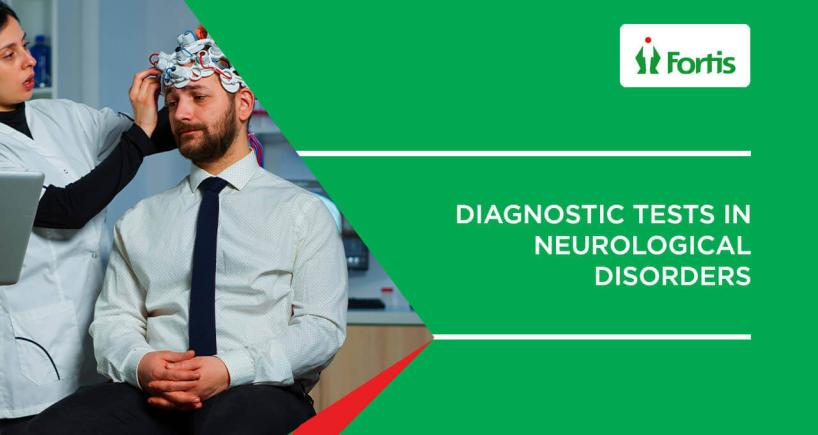
Diagnostic tests in Neurological disorders
Disorders that affect the brain, spinal cord and nerves throughout the body are commonly known as neurological disorders. Typically, any kind of change in the structure or electrical disturbances in the brain and nerves result in a wide range of symptoms. Some specific causes of neurological disorders can include genetic, congenital, infections or even health problems such as malnutrition or injuries to the brain, spinal cord or nerves. Some of the commonly occurring neurological disorders are epilepsy, neuromuscular disorders, autism, brain tumours and cerebral palsy. Some disorders occur before birth and those are congenital disorders, whereas others are caused due to structural defects or degeneration and at times infections. Vision, hearing, cognition and movement can be affected depending on the extent and the location of the damage. In short, damage to the nervous system results in varied neurological disabilities.
There are different types of signs of neurological disorders which depend upon the specificity of the affected area of the body. While in most cases physical symptoms may be visible, emotional signs and symptoms are also experienced in some cases. Emotional highs and lows such as mood swings or sudden outbursts or even depression and delusions are part of the emotional symptoms of neurological problems. The symptoms are suggestive of other disorders and conditions as well and the team of neurologists at Fortis Hospital Kalyan always recommend that it is important to seek help right away if such symptoms are observed in yourself or someone close to you. Neurological disorders can at times result in various serious consequences if left untreated and our team of specialists at Fortis Kalyan stress on receiving assistance without delay for any individual suffering from a neurological disorder.
What are some of the most common neurological symptoms?
The nervous system in the human body is made up of two main parts, the brain and the spinal cord that act as the central nervous system and the peripheral nervous system that includes the muscles, tissues and nerves throughout the body. Interruptions between these connections cause neurological symptoms. The symptoms associated with neurological disorders originate in the peripheral nervous system, which transmits sensory information between the muscles, nerves and tissues to the brain. Numbness, tingling sensations, burning, muscle weakness or paralysis and localised sensitivity are some of the observable symptoms. Local injuries or pain related to physical trauma or any systemic illness are some of the reasons for neurological symptoms.
The sensation of pain related to a specific area due to direct trauma is easier to diagnose and treat than referred pain, which is a complex condition felt in different parts of the body rather than the actual region of injury or illness. There are certain accompanying symptoms such as confusion, altered smell or taste, generalised lethargy, dystonia that is involuntary muscle contractions, loss of balance, or paralysis of a body part. Difficulty in chewing, loss of bladder control, or nausea and digestive problems are some of the accompanying symptoms that are related to the digestive system.
How are neurological disorders diagnosed? Can I do a self-assessment?
Our team of neurologists and neurosurgeons at Fortis Hospital Kalyan always advise on seeking professional medical assistance if you or your loved ones are experiencing any kind of neurological symptoms. While several medical examinations are performed to diagnose these conditions, the presence of complaints such as constant or recurring headaches, blurring of vision, behavioural changes, numbness in the upper and lower extremities, weakness, tremors, changes in body balance will require you to seek professional help. Self-assessments are not a sure shot confirmation of the presence of any neurological disorder.
The neurologists at Fortis Kalyan begin the treatment plan with a complete medical history and physical examination. Some of the commonly used diagnostic tests are CT scans, an imaging test that produces horizontal images of the body and is more detailed than a general x-ray. An EEG, or an electroencephalogram, is used to record the continuous electrical activity of the brain. An MRI is used to produce detailed images of organs and other structures within the body. An ultrasound more commonly known as sonography which is an imaging test using high-frequency soundwaves to create images of blood vessels and organs, this test is useful in assessing the blood flow throughout the vessels.
Every neurological disorder requires different types of testing and treatment modalities and our team of neurologists and neurosurgeons at Fortis Hospital Kalyan are adept at diagnosing and formulating the requisite treatment plan for every patient.
Categories
Clear allMeet the doctor

- Neurology | Neurology
-
13 Years
-
1400









